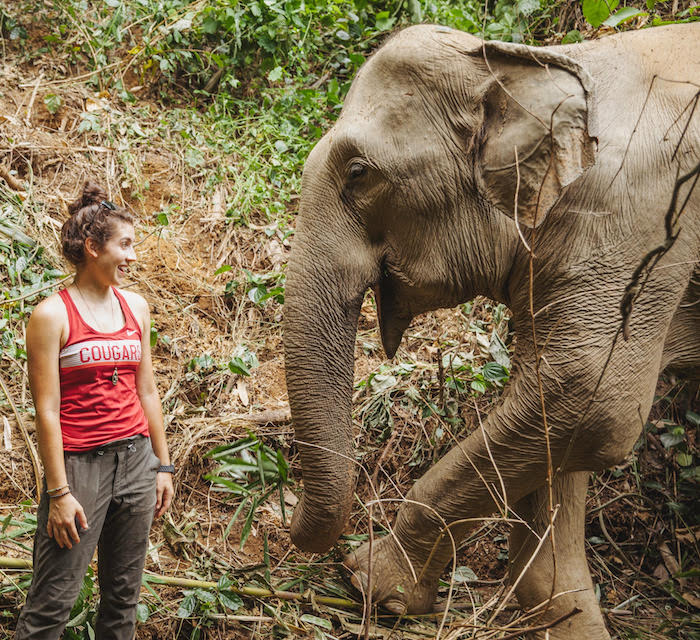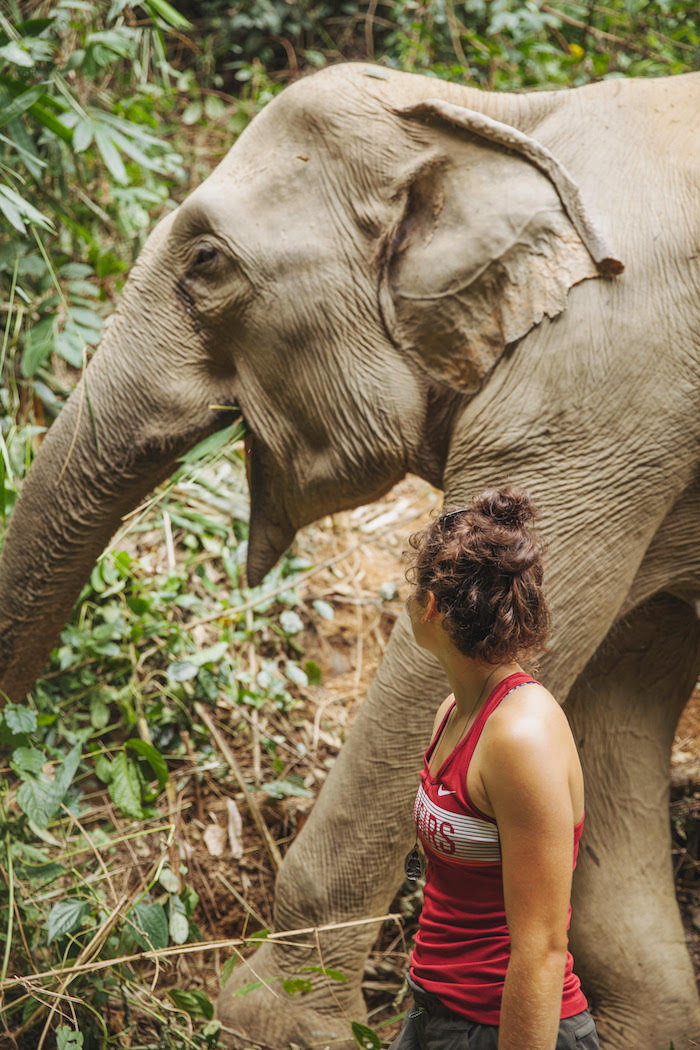LIFE
Get Inspired
Meet Danielle Carnahan, an elephant researcher and wildlife advocate

Ever dreamed of traveling the world, caring for animals and studying their behavior? Researcher and wildlife advocate Danielle Carnahan does just that! Her work studying elephant behavior, specifically post-traumatic stress disorders, allows her to spread awareness about the proper ways to treat these intelligent animals. We talked to Danielle about how she got started, what her research is like and advice for GL girls interested in wildlife conservation efforts.
GL: What sparked your initial interest in wildlife protection and elephants?
Danielle: When I was in college, I was pre-vet. I wouldn't say like my whole life I was committed to being a vet, it was more that I wanted to work with animals and I didn't really know what other jobs there were...the summer going into my junior year of college, I wanted to do a study abroad program, and I found one that was a month long in Thailand working in a variety of different places. One was an elephant sanctuary, one was a marine conservation dive team and one was doing vet work at a dog and cat clinic. But while I was there at that sanctuary, I was like, "Wow, this is so incredible." I had no idea all the things that the elephants were going through, and I was so inspired by it. And it was just like a moment that kind of clicked where I was like, "Okay, I don't think I want to be doing vet work, but I need to be helping these animals."
GL: What kind of research are you doing?
Danielle: During graduate school, we had to do a master's thesis, and I knew I wanted to do something about elephants in captivity, because there's so many issues when it comes to [that]. It's hard to manage them—they're just so intelligent and such complex animals...so I started researching more and more about the impacts [that] captivity and tourism and all the things that we're doing to elephants [have] on them, and it kind of brought me more into animal psychology, elephant psychology, studying their brain and ultimately landing on looking at complex post-traumatic stress disorders.
GL: What does a typical day look like for you?
Danielle: When I was in Thailand, it kind of depended on the day, but usually I would be out in the jungle with them for 5 or 6 hours. It was really nice because the sanctuary has built treehouses and different huts in the jungle. You could really be out of the elephants' way and not influence their behavior at all. The main purpose of my research is to observe them when they're not being told what to do. All of these elephants came from a background of pretty intense training, where if a human is around, they're gonna act way different...so in order to see if they were actually experiencing chronic stress, I wanted to see what they did when they weren't being influenced by human activity or anything else.
A lot of it is and was just sitting around and watching. It sounds boring, but it's so fascinating to sit and watch the elephants because they are always doing something different. Nothing is ever the same...some days you go out in the jungle with them and they're sleeping all day...but on some days they're swimming in the water and splashing around and trumpeting, and then you're just like, "Oh my gosh, I feel like I'm in a documentary right now!"
More about Danielle:
Dream travel destination: "I have 3 top choices! First is South Africa, then Kenya and Sri Lanka. I would go to any of them right now if I could, but I've been dying to go to Africa."
Favorite wildlife book/documentary: "I really like the book The Elephant Whisperer. It's about this guy who has an elephant preserve in South Africa. It's so interesting to hear about his life taking in this herd and everything that happens with them. I love so many documentaries! Like every documentary that David Attenborough has ever done. I love all the documentaries about climate change and about the environment and wildlife, all of those Planet Earth kind of things."
Favorite hobbies: "I love being outside, so usually I'm always doing stuff outdoors. I love hiking when I'm home— I'm from Washington State and there's so much good hiking there. And I love working out and being active. I love traveling, obviously—that's probably like the #1 thing that I always do when I have the availability [to], is to travel to different places, experience new cultures, new food and meet new people."
Most interesting thing in Nepal: "Where I am, I'm right on the border of a national park. There are wild rhinos that come into town all the time. And they're just walking down the street. At least six times in the past two months, I'll be sitting in town at a restaurant and I look down the street and there's just wild rhinos walking down...[at] one of the hotels in town, one of the rhinos really likes sleeping in the garden."

GL: What surprised you most about working with the elephants?
Danielle: So many things surprise me about elephants! With my research, I would say what surprised me was actually to see how many of the elephants were able to recover. Because I wasn't sure if many of them would be able to break out of the chronic stress patterns that they were in. So many of the elephants, when they got brought in, were like destroyed, stressed, abused and underweight to a point where you wouldn't even think they would ever act like an elephant again. To see them interacting with other elephants and freely roaming around like they should is amazing...my takeaway from my research was that the elephants coming from tourism were experiencing higher levels of stress than animals coming from other industries like logging. Because they're wild animals, and it's not natural for them to interact with humans so much, and so it's stressful to constantly have humans coming up and getting in their face, touching them and climbing on them.
GL: What do you hope people take away from your research?
Danielle: I would say not just with elephants but with all animals, all wildlife—to question what we see as being normal. Because in our world, we think it's normal to hold a baby sloth or go and pet tigers that are chained up or ride on the back of one of the largest animals in the world—elephants. We view these things as being normal because they're happening, but just because they've been happening doesn't make them normal at all...does it sound normal to go up to a wild animal and be like, "You have to take a bath now, and I'm gonna bathe you." No, then why would you want them to do that?...just because you see other people doing it doesn't mean that you should do it. But nowadays with social media, especially, wildlife exploitation has been so perpetuated. People see a picture of someone on spring break riding an elephant, and they're like, "Aw, they got so many likes on that! That's such a cool picture. I wanna do that." And that cycle continues—people want to do things to get cool pictures, to get validation from strangers on the Internet...and it's made things so much worse in wildlife exploitation, for elephants and for all species. And people need to stop and think, "Oh, I'm seeing all these pictures of people doing weird things with elephants. Is that normal? Should we be doing this?"
GL: What can GL readers do to help with wildlife conservation and educate others?
Danielle: I think the number one thing that helps is spreading awareness about wildlife exploitation and about what you should and shouldn't be doing with elephants and other species. It seems obvious to someone like me that you shouldn't ride an elephant...but there's so many people who don't know, and you can't blame people for not knowing. They just aren't educated on the subject...the only way things are going to change is if people are aware of the issue and aware of how to work around the issue. I can do as much research as I want, but if nobody in the world knows that it's not ethical to ride an elephant or give an elephant a bath, it doesn't matter what I do. Whether it's [in] school doing a project or presentation, or talking to your families about it, it can be a great way to spread more awareness.
GL: What advice do you have for GL readers interested in studying conservation or animal sciences and how they can follow their passions?
Danielle: I would say the number one thing is not to get discouraged, because conservation is a really hard field to work in for a lot of reasons. First of all, there's not a lot of jobs, everyone wants you to work for free [and] there's not a lot of money...but at the same time, if you don't get discouraged, I feel like working in conservation is one of the most rewarding things. I mean, I get discouraged, too, but at the same time I'm like, "Wow, I would not want to be doing anything else." It never feels like work. I'm here in Nepal right now working all day every day, but it doesn't feel like [it]...so I would just say not to get discouraged and to figure out exactly how to get to your end goal—like do you need a masters degree, do you need a PhD, [or] do you need to study zookeeping? If you can look at your end goal and what you want to be doing, ideally, you can work your way backwards.
To keep up with Danielle and the elephants, visit her blog The Call to Conserve and follow her on Insta @daniellecarnahan4 and TikTok @daniellecarnahan4!
Interview has been edited and condensed for length and clarity.
POSTED IN LIFE, Get Inspired

 become a contributor
become a contributor


















